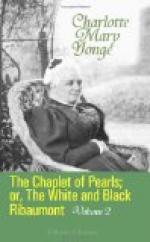‘Blaise, do you not know me?’
‘It is our Lady. Ah!’
The next moment the wanderer was seated in the ample wooden chair of the head of the family, the farmer and his two stout sons standing before her as their liege Lady, and Mere Perrine hanging over her, in great anxiety, not wholly dispelled by her low girlish laugh, partly of exultation at her successful evasion, partly of amusement at their wonder, and partly, too, because it was so natural to her to enjoy herself at that hearth that she could not help it. A savoury mess from the great caldron that was for ever stewing over the fire was at once fished out for her, before she was allowed to explain herself; and as she ate with the carved spoon and from the earthenware crock that had been called Mademoiselle’s ever since her baby-days, Perrine chafed and warmed her feet, fondled her, and assured her, as if she were still their spoiled child, that they would do all she wished.
Pierre and Tiennot, the two sons, were sent out to fodder the cattle, and keep careful watch for any sounds of pursuers from the convent; and Blaise, in the plenitude of his respects and deference, would have followed them, but Eustacie desired him to remain to give her counsel.
Her first inquire was after the watch-tower. She did not care for any discomfort if her vassals would be faithful, and hold it out for her, till she could send for help to the allies of her husband’s house, and her eyes glanced as she spoke.
But Blaise shook his head. He had looked at the tower as Madame bade, but it was all in ruins, crumbling away, and, moreover, M. le Chevalier had put a forester there—a grim, bad subject, who had been in the Italian wars, and cared neither for saint nor devil, except Chevalier Narcisse. Indeed, even if he had not been there, the place was untenable, it would only be getting into a trap.
‘Count Hebert held it out for twelve days against the English!’ said Eustacie, proudly.
’Ah! ah! but there were none of your falconets, or what call you those cannons then. No; if Madame would present herself as a choice morsel for Monsieur le Chevalier to snap up, that is the place.’
Then came the other plan of getting an escort of the peasants together, and riding with them towards the Huguenot territories around La Rochelle, where, for her husband’s sake, Eustacie could hardly fail to obtain friends. It was the more practicable expedient, but Blaise groaned over it, wondered how many of the farmers could be trusted, or brought together, and finally expressed his intention of going to consult Martin, his staunch friend, at the next farm. Meantime, Madame had better lie down and sleep. And Madame did sleep, in Perrine’s huge box-bedstead, with a sweet, calm, childlike slumber, whilst her nurse sat watching her with eyes full of tears of pity and distress; the poor young thing’s buoyant hopefulness and absence of all fear seemed to the old woman especially sad, and like a sort of want of comprehension of the full peril in which she stood.




